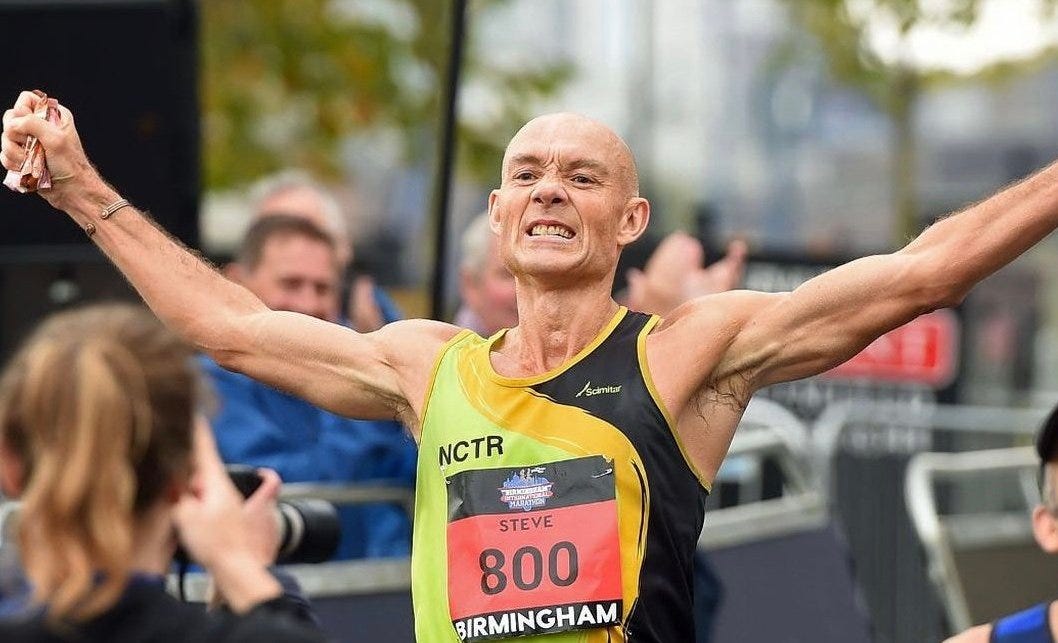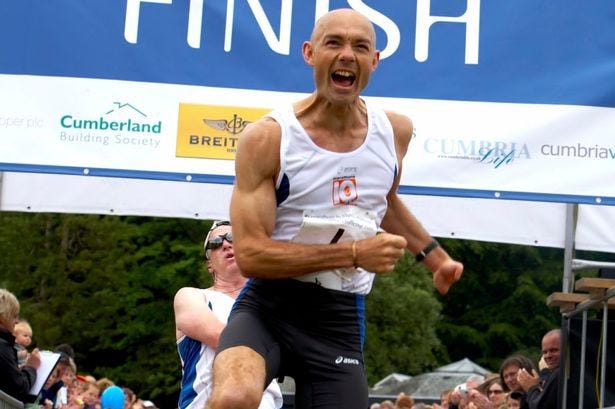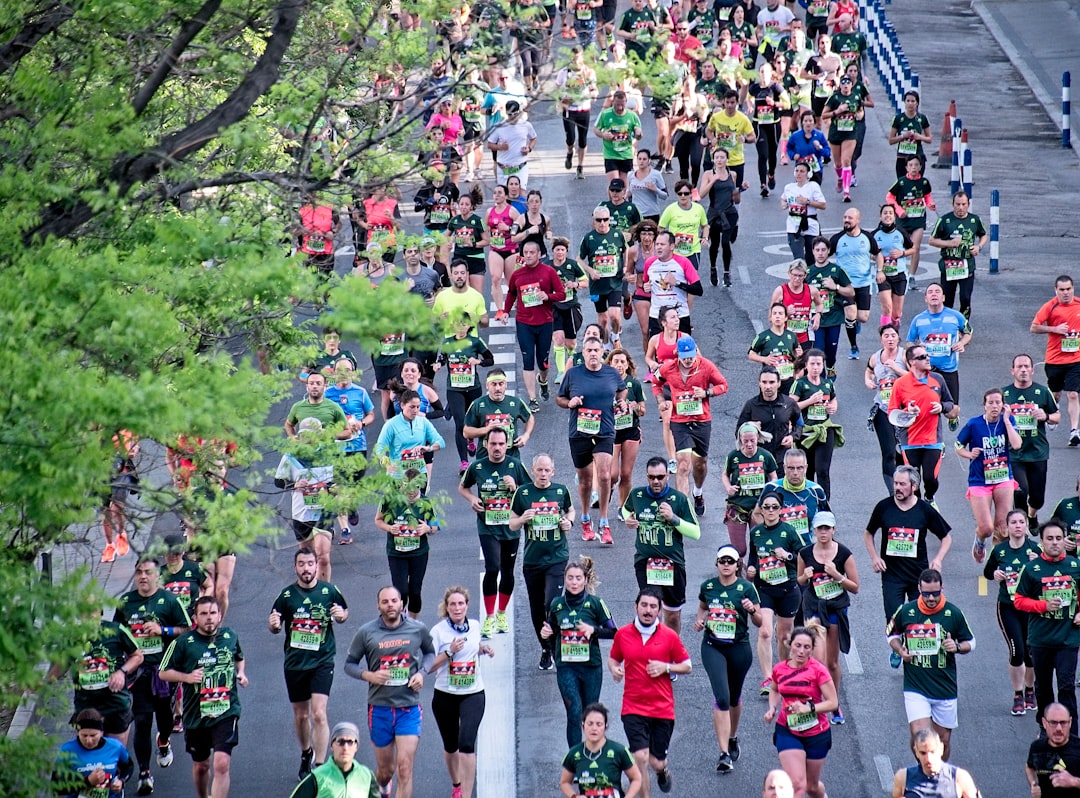Meet the Mega Marathoners: How an elite group of endurance athletes have run thousands of marathons - each!
As Steve Edwards closes in on 1,000 marathons, Running Tales looks at the marathoners who have already reached that target and how counting races is a complex art
There is a list for everything these days.
But there can be few which outline the capability of human endurance more profoundly than the Mega Marathon List.

It ranks those runners who have completed a combination of at least 300 marathons and ultra marathons.
According to the Mega Marathon website, the lists’ members “represent a mere 0.0000000427% of the people on this planet”.
Among its members, 49 runners have completed an astounding 1,000 or more marathons/ultras.
That number includes two Brits, Brian Mills (1,457 marathons/ultras) and Martin Bush (1,176) - but a third is closing in on that mind-blowing target.
The latest list is dated to the end of 2022 and shows Steve Edwards as having completed 978 marathons/ultras. He sits in 50th position.
Some of those 978 runs were ultra marathons, while Edwards has gone on to complete more marathons in 2023. His tally for marathons alone currently stands at 954.
From 100 to 1,000
Edwards started running marathons in 1981, completing his first in his home town of Coventry aged just 18.
Nine years later he finished his 100th at St Albans, becoming the youngest person in the world to achieve the feat at that time.
The achievements kept coming, including a marathon personal best of 2:51 in Stockholm in 1991, breaking the world record for the most official marathons in a year in 1992 and becoming the first person to set a world record for the fastest 10 marathons in 10 days in 2008.
Last month, Edwards told the Running Tales Podcast he “didn’t start running marathons seriously until 1988.
“I wanted to run 100 official marathons and set the record for the youngest person to do that. Ever since then I’ve tried to establish new records for multi-marathon running.
“The aim was to run 500 official marathons, all under three hours 30, which I managed to achieve in 2012 with an overall average of three hours, 12 minutes.
“Thinking I might be worn out by then and carrying too many niggles, I thought that would be time to call it a day - but actually I didn’t feel too bad.
“So I decided to carry on, and 600 beckoned, then 700 and 800. Before long, people were talking about the 1,000 - and here we are.
“It’s getting ever more difficult, but that’s the nature of the marathon.”

But Edwards’ formidable total pales when compared to those at top of the Mega Marathons List, with the top six runners having completed 2,000 marathons/ultra marathons.
While the brilliance of their totals is undoubted, the list comes with significant caveats that make such comparisons debatable, if not irrelevant.
The 3,000 marathon man
It is worth, for example, looking at the man who tops the pile.
According to the list, German Christian Hottas has run an astonishing 3,162 marathons.
With a sub-three hour marathon to his name, the 67-old-year old has topped the Mega Marathons list since August 2011 and completed his 3,000th marathon in June 2021.
A congratulatory post on the 100 Marathon Club Deutschland website said Hottas’ marathon career dates back to 1987 in his home city of Hamburg.
Three years later he finished a race in Schwerin in two hours, 59 minutes and 20 seconds.
But, according to that website, it was from 2000 onwards that Hottas really started increasing the frequency of his marathons, jumping from an already impressive 450 up to 1,000 by 2005.
In 2013, he reached 2,000 at the Hanover Marathon, complete “with an escort of 81 runners from 14 nations”.
Also on Running Tales:
Super Mario - The Ironman who always finishes with a smile on his face
Running to show the humanity behind every blanket - the story behind the 16:15 Charity Run
Hottas’ big 3,000 moment came during the Coronavirus pandemic, meaning the number of people who could run with him was limited.
The event “took place exclusively with close friends and long-time companions,” the 100 Marathon Club Deutschland said.
In all, about 40 athletes took part in the run at Lopausee in Amelinghausen, Lower Saxony.
It was organised by Hottas himself, something it seems has not been uncommon during his running career.
In an interview with endurance sports writer Tim Teege, another of the leading lights of the list, Hans-Joachim Meyer, said: “As I understand it, Christian Hottas collected a lot of his marathons by setting up very small public marathons and did them with a few fellow runners who didn’t necessarily complete them like him.
“Because there simple aren’t enough ‘bigger’ races to collect so you could arrive at numbers like these.”
Meyer, who has 1,619 marathons/ultras to his name and sits in 11th position, told Teege how the criteria varies around the world, with German rules only requiring an event to be publicly announced and to have three starters.
Other countries have much tighter rules, with Meyer adding: “In Denmark, finished ultra marathons don’t count even though they are longer than marathons. In Finland, your race has to have at least 20 finishers, not just three starters.”
In the UK, the country’s 100 Marathon Club’s rules state members must have completed 100 or more races, with a race defined as something organised by an identifiable race director, open to all applicants, advertised at least 30 days beforehand and having at least 15 participants finish.
‘Hard work and dedication’

Steve Edwards’ own criteria sees him count only official races towards his total. He has also banned himself from walking in races and set the target of completing his 1,000 marathons in an average time of less than three hours and 30 minutes per event - a goal which would potentially constitute a brand new world record.
Along the way, he has already hit a series of milestones including running more than 300 sub-3:15 marathons, 500 sub-3:20s and more than 800 sub-3:30s.
His overall average finish time for all 954 marathons stands at three hours, 20 minutes and 28 seconds.
Edwards told Running Tales that his target would be a “brand new record.
“Certainly looking at some of the average finish times of the people already at 1,000 plus marathons, we’re talking well over four hours, if not nearer to five hours.
“To try and keep it to under three hours 30 is the dream. Hopefully it will set a benchmark for someone to have a go at in the future.
“For me, it’s trying to leave a legacy just to show what can be achieved with hard work and dedication. At the end of the day we’re all human beings.
“There is nothing special about me. I’m just an ordinary person, and certainly have no natural ability.
“Everything I have done in the running community has been through hard work and dedication.
“I wouldn’t advise anyone to go off and start running lots and lots of marathons, but with a bit of patience, dedication and focus, you can show what can be achieved.”
‘Created to inspire’… but accurate?

The differences in criteria across the world are widely recognised, while the Mega Marathon List is honest about the inevitably incomplete nature of the data it collects.
Its website states: “This ranking is for information purposes only… created to inspire greater goals and to fuel the competitive nature within us all.
“While we don’t pretend that this is the complete and definitive list of runners that have achieved this milestone, we strive to make the list as accurate as possible, and rely on the good faith and integrity of each runner to present a true accounting of his or her achievements.”
Nevertheless, the list provides a fascinating gateway into the world of a group of extraordinary endurance runners.
Unlike Olympic track heroes from Usain Bolt to Mo Farah, the marathon colossuses of Eliud Kipchoge or Brigid Kosgei, or even ultra stars such as Kilian Jornet and Jasmin Paris, these runners are barely known outside their own households.
Yet their achievements, and the sheer weight of the numbers they have reached, is staggering.
Take the leading woman on the list, Sigrid Eichner, an 82-year-old who has completed 2,313 marathons/ultras.
In an article detailing Eichner’s achievements, Canadian Running said the Berlin marathoner’s running career did not begin until she was in her 40s, and that she started running “to take time for herself and escape domestic life”.


Eichner told DW Stories that, for her, running is about the “priceless” feeling of being able to do something and leave something behind.
According to a Daily Express article from 2014, the highest listed Brit, Brian Mills, 67, is rumoured to have a butterfly tattoo for each of his marathons - at least up to marathon/ultra 820, the number he had completed when they spoke to him.
Mills completed his 1,000th marathon/ultra at Longford, Ireland in 2014 - and just kept going.
He’s now reached 1,457 and sits in 14th place on the Mega Marathon list.
The youngster with marathons on his mind
One name to keep an eye out for is Adam ‘Tango’ Holland.
Although he currently ranks at a relatively lowly 413th on the list, having completed a ‘mere’ 463 marathons and ultras, Holland has time on his side.


At 35, he is younger than most of his Mega Marathon rivals, and he’s already beaten two of Edwards’ records by becoming the youngest person in Europe to reach 100 marathons - he was 23 - and the fastest to do 10 in 10 days, at an average speed of two hours 45.
How far Holland will rise up the list remains to be seen, but to even figure in such company is a remarkable achievement.
The Mega Marathon website says more people have orbited the earth in outer space and more climbers have summited Mount Everest than the number of people who have qualified to sit in the esteemed company of those on its list.
The names of Neil Armstrong and Edmund Hillary may reverberate around the world, but those who grace Mega Marathon’s top echelons have, distance wise at least, run round it.
Steve Edwards is an ambassador for Every Run Counts, a new scheme which encourages people to be active to boost their physical and mental health. You can read about the app which aims to make people “fitter, healthier and improve their mental health” in our article here











Where is the list of mega-runners? I won't be on it for a long time... probably around 55 years old but I will be someday and want to know where to go. I run about 20 races a year but will be toning it down after race #110 to 10-12 a year so I can actually save for retirement.